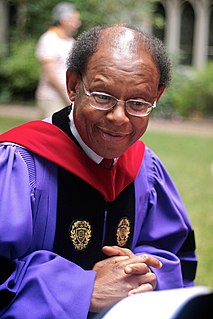A Quote by James H. Cone
The belief that the soul continues its existence after the dissolution of the body is a matter of philosophical or theological speculation rather than of simple faith, and is accordingly nowhere expressly taught in Holy Scripture
Related Quotes
Just as in one man there is one soul and one body, yet many members; even so the Catholic Church is one body, having many members. The soul that quickens this body is the Holy Spirit; and therefore in the Creed after confessing our belief in the Holy Spirit, we are bid to believe in the Holy Catholic Church.
But let there be no misunderstanding: it is not that a real man, the object of knowledge, philosophical reflection or technological intervention, has been substituted for the soul, the illusion of theologians. The man described for us, whom we are invited to free, is already in himself the effect of a subjection more profound than himself. A 'soul' inhabits him and brings him to existence, which is itself a factor in the mastery that power exercises over the body. The soul is the effect and instrument of a political anatomy; the soul is the prison of the body.
When you grow up being taught to worship, whatever that means, there is an array of body-rich symbols: tears, blood, crucifixion, the stations of the cross, transubstantiation... Faith is a belief in something that is irrational, and so to have faith, there is some correlation there with the belief in the art.
In a word, the Holy Scripture is the highest and best of books, abounding in comfort under all afflictions and trials. It teaches us to see, to feel, to grasp, and to comprehend faith, hope, and charity, far otherwise than mere human reason can; and while evil oppresses us, it teaches how these virtues throw light upon the darkness, and how, after this poor, miserable existence of ours on earth, there is another and an eternal life.
The Christ within who is our hope of glory is not a matter of theological debate or philosophical speculation. He is not a hobby, a part-time project, a good theme for a book, or a last resort when all human effort fails. He is our life, the most real fact about us. He is the power and wisdom of God dwelling within us.
Sören Kierkegaard has another answer: human existence is possible as existence not in despair, as existence not in tragedy; it is possible as existence in faith... Faith is the belief that in God the impossible is possible, that in Him time and eternity are one, that both life and death are meaningful.
But what of faith? What of fidelity and loyalty? Complete trust? Faith is not granted by tangible proof. It comes from the heart and the soul. If a person needs proof of god's existence, then the very notion of spirituality is diminished into sensuality and we have reduced what is holy into what is logical.-Drizzt Do'urden
I did not learn my theology all at once, but had to search constantly deeper and deeper for it. My temptations did that for me, for no one can understand Holy Scripture without practice and temptations...I t is not by reading, writing, or speculation that one becomes a theologian. Nay, rather, it is living, dying, and being damned that makes one a theologian.
For Scripture is the school of the Holy Spirit, in which, as nothing is omitted that is both necessary and useful to know, so nothing is taught but what is expedient to know. Therefore we must guard against depriving believers of anything disclosed about predestination in Scripture, lest we seem either wickedly to defraud them of the blessing of their God or to accuse and scoff at the Holy Spirit for having published what it is in any way profitable to suppress.
No matter how much we may study, it is not possible to come to know God unless we live according to His commandments, for God is not know by science, but by the Holy Spirit. Many philosophers and learned men came to the belief that God exists, but they did not know God. It is one thing to belief that God exists and another to know Him. If someone has come to know God by the Holy Spirit, his soul will burn with love for God day and night, and his soul cannot be bound to any earthly thing.
The existence of pleasure is the first mystery. The existence of pain has prompted far more philosophical speculation. Pleasure and pain need to be considered together; they are inseparable. Yet the space filled by each is perhaps different. Pleasure, defined as a sense of gratification, is essential for nature
Belief is in a sense passive, an agreement or acceptance only; faith is active and positive, embracing such reliance and confidence as will lead to works. Faith in Christ comprises belief in Him, combined with trust in Him. One cannot have faith without belief; yet he may believe and still lack faith. Faith is vivified, vitalized, living belief.
In this simple but profound psychological way Scripture tells the history of the fall and of the origin of sin. In this way sin continues still to come into being. It begins with the darkening of the understanding, continues with the excitement of the imagination, stimulates desire in the heart, and culminates in an act of the will
































